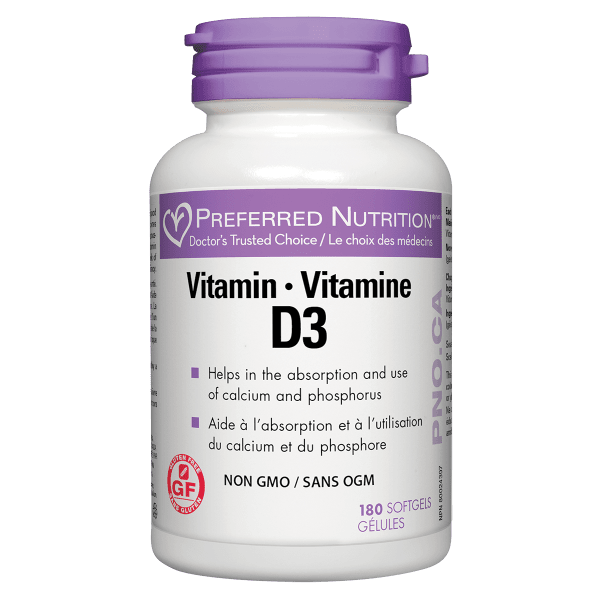Preferred Nutrition®
Vitamin D3 1000 IU Softgels
Vitamin D3 1000 IU Softgels
- Helps maintain immune function
- Helps build strong bones and teeth
- Vitamin D intake, when combined with sufficient calcium, a healthy diet, and regular exercise, may reduce the risk of developing osteoporosis
- Helps prevent vitamin D deficiency
- Helps in the absorption and use of calcium and phosphorus
- Provides 1000 IU of vitamin D3 in the preferred cholecalciferol form
SKU: PN0518
NPN: 80024397
Share

Vitamin D3 1000 IU Softgels
Additional Information
Recommended Dosage
Recommended adult dose: 1 softgel daily or as directed by a health care practitioner.
Allergy Information
This product does not contain artificial preservatives, colours, or sweeteners; no dairy, starch, sugar, wheat, gluten, yeast, soy, corn, egg, fish, shellfish, salt, tree nuts, or genetically modified genes or proteins.
Ingredients
| Each softgel contains: | |
| Medicinal ingredient: | |
| Vitamin D3 (cholecalciferol) | 1000 IU (25 mcg) |
Organic flaxseed oil, softgel (gelatin, glycerin, purified water).
Cautions
Keep out of reach of children.
References
Cashman, K.D., Ritz, C., Kiely, M., et al. (2017). Improved dietary guidelines for vitamin D: Application of individual participant data (IPD)-level meta-regression analyses. Nutrients, 9(5), 469.
Delrue, C., & Speeckaert, M.M. (2023). Vitamin D and vitamin D-binding protein in health and disease. Int J Mol Sci, 24(5), 4642.
Gaffney-Stomberg, E., Hughes, J.M., Guerriere, K.I., et al. (2022). Once daily calcium (1000 mg) and vitamin D (1000 IU) supplementation during military training prevents increases in biochemical markers of bone resorption but does not affect tibial microarchitecture in army recruits. Bone, 155, 116269.
Harrison, S.E., Oliver, S.J., Kashi, D.S., et al. (2021). Influence of vitamin d supplementation by simulated sunlight or oral D3 on respiratory infection during military training. Med Sci Sports Exerc, 53(7), 1505-16.
He, C.S., Handzlik, M., Fraser, W.D., et al. (2013). Influence of vitamin D status on respiratory infection incidence and immune function during 4 months of winter training in endurance sport athletes. Exerc Immunol Rev, 19, 86-101.
Lips, P., Cashman, K.D., Lamberg-Allardt, C., et al. (2019). Current vitamin D status in European and Middle East countries and strategies to prevent vitamin D deficiency: A position statement of the European Calcified Tissue Society. Euro J Endocrinol, 180, P23-54.
Macdonald, H.M., Wood, A.D., Aucott, L.S., et al. (2013). Hip bone loss is attenuated with 1000 IU but not 400 IU daily vitamin D3: A 1-year double-blind RCT in postmenopausal women. J Bone Miner Res, 28(10), 2202-13.
Statistics Canada. (2023). Table 13-10-0872-01 Vitamin D status of Canadians, combined cycles, by age group and sex. Retrieved from https://www150.statcan.gc.ca/t1/tbl1/en/tv.action?pid=1310087201
Yao, P., Bennett, D., Mafham, M., et al. (2019). Vitamin D and calcium for the prevention of fracture: A systematic review and meta-analysis. JAMA Netw Open, 2(12), e1917789.

